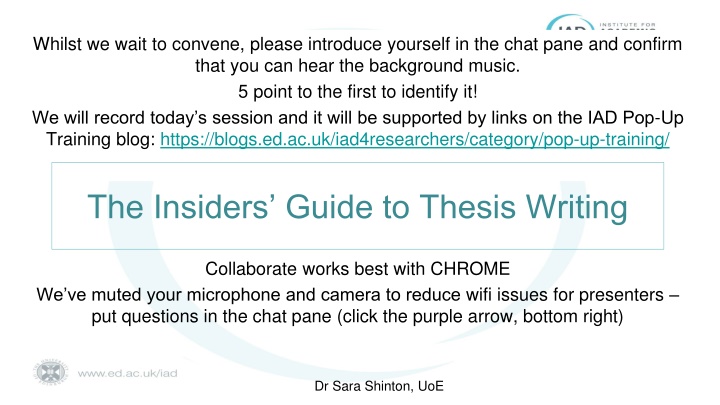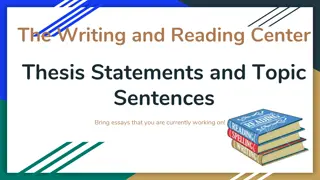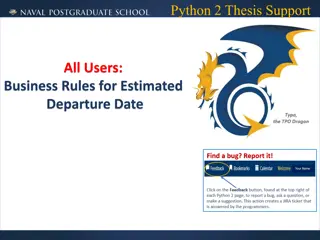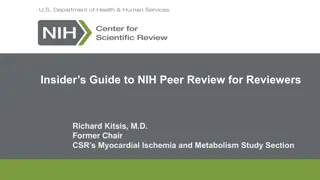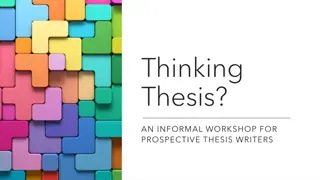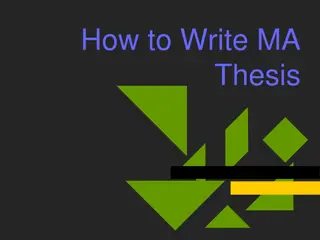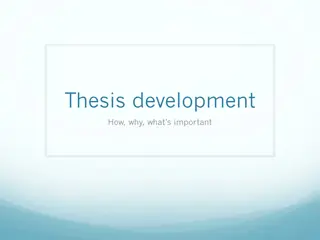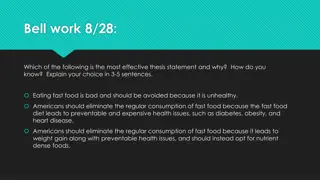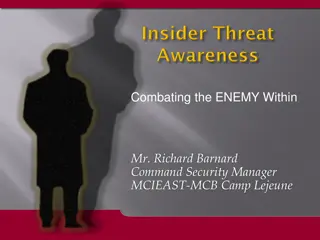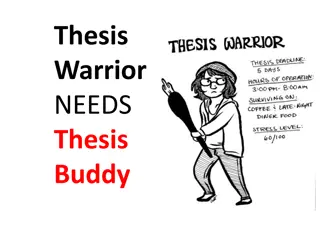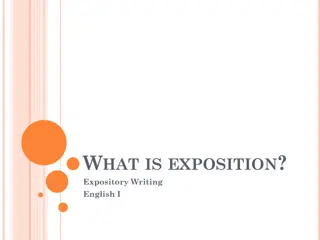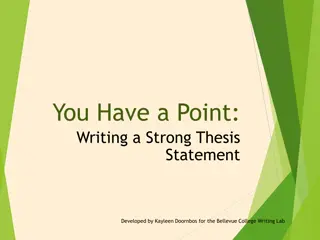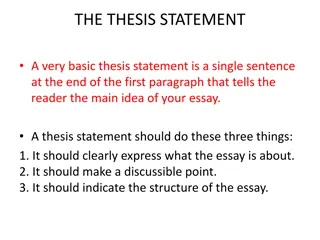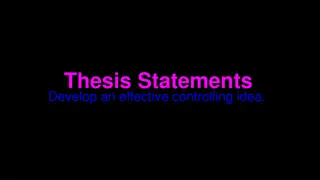Insider's Guide to Thesis Writing: Key Ideas and Tips
Uncover the essential aspects of thesis writing, including big questions, formatting guidelines, and critical judgment. Get started on structuring your thesis effectively with insights from experts and valuable resources provided in this comprehensive session. Empower yourself to navigate the thesis writing journey successfully and emerge well-prepared for your viva and beyond.
Uploaded on Mar 06, 2025 | 0 Views
Download Presentation

Please find below an Image/Link to download the presentation.
The content on the website is provided AS IS for your information and personal use only. It may not be sold, licensed, or shared on other websites without obtaining consent from the author.If you encounter any issues during the download, it is possible that the publisher has removed the file from their server.
You are allowed to download the files provided on this website for personal or commercial use, subject to the condition that they are used lawfully. All files are the property of their respective owners.
The content on the website is provided AS IS for your information and personal use only. It may not be sold, licensed, or shared on other websites without obtaining consent from the author.
E N D
Presentation Transcript
Whilst we wait to convene, please introduce yourself in the chat pane and confirm that you can hear the background music. 5 point to the first to identify it! We will record today s session and it will be supported by links on the IAD Pop-Up Training blog: https://blogs.ed.ac.uk/iad4researchers/category/pop-up-training/ The Insiders Guide to Thesis Writing Collaborate works best with CHROME We ve muted your microphone and camera to reduce wifi issues for presenters put questions in the chat pane (click the purple arrow, bottom right) Dr Sara Shinton, UoE
All the links and a recording of this session will be posted on the blog soon https://blogs.ed.ac.uk/iad4researchers/2020/0 4/15/the-insiders-guide-to-thesis-writing/
The plan... Overview of some big ideas from Sara (Head of Researcher Development) Introduction from our experts Marie Louise Natalie Antonis Marlene
Three big questions... What is a PhD ? What is a thesis (and what is it NOT) ? Why does the thesis exist ? fit for purpose... that is to pass!
Three big questions... show you have done some work(!) and impress examiners make your viva as pleasant as possible satisfy expectations of your institution fit for purpose... that is to pass!
GET STARTED Guidelines here https://www.ed.ac.uk/academic-services/students/thesis-submission Prepare a word document using the right font, spacing Format : https://www.ed.ac.uk/files/atoms/files/thesisbinding.pdf 4cm binding margin 2cm head margin 2.5cm fore-edge margin 4cm tail margin
Thesis Big Ideas Context key work of others contribution to your field the aim of your research your methods and results
Thesis Big Ideas Critical Judgment Refer to the key papers Demonstrate critical engagement Why did you use this method / approach ? Is your interpretation the only possible explanation ? What are the implications of your work ?
Thesis Survival - Organisation Develop a logical filing system - computer based and physical BACK UP EVERYDAY Copy your lab book or any key information Refer back to your plan frequently Check University regulations SMARTObjectives
SMART Objectives Specific Measurable Agreed Realistic Time bound
Supervisor management Establish the ground rules Keep some form of record of your meetings Don t expect too much May not tackle English and science simultaneously Probably can t judge the work unless it is presented completely (i.e. including figures, tables etc) Give them a neat, complete version of each chapter (proof-read thoroughly and spell checked) s28 if short of time
An examiners view of the positive Has an appreciation of what came before Focuses on the interesting and important Is well reasoned Will change the way people think Has publishable results Is logical in presentation, analysis and arguments Is well illustrated with figures and graphs Is written without grammatical and spelling errors Has an appreciation of what comes next Professor Colin Whittemore, Edinburgh University
and the negative Is not interesting Deals with small or badly described problems Reasons poorly Has badly-designed experiments Repeats or confirms well-established things Contains inadequate analysis Has poor presentation of illustrations Contains grammatical and typing errors Professor Colin Whittemore, Edinburgh University
A well written conclusion... Ensures that the reader / examiner knows to what extent the big ideas of the thesis were realised Defines the significance of the work you have undertaken ie Sets your work in context, indicates implications on related areas and suggests how it might be applied elsewhere Reads very differently from your abstract which merely lists the work you have undertaken Professor Peter Tasker, Edinburgh University
Thoughts about ownership It is YOUR thesis You must be 100% engaged You will be the world expert It is hard work You have the responsibility for understanding and remembering what you do and why you do it
We have gathered some questions and have our own ideas of what to share, but please add your questions in the chat pane Natalie Marlene Marie-Louise Antonis
What are your tips for staying organised?
How do I format my thesis when its changing every day? https://www.ed.ac.uk/files/atoms/files/thesisbinding.pdf http://www.docs.is.ed.ac.uk/skills/documents/3807/3807.pdf
What are the best ways to manage references before and as you write?
How did you manage the relationship with your supervisor when you were writing?
Have you any extra advice for international students? Sentence starters : https://www.pinterest.com/pin/510947520198510410/ Writing course (IAD)
How do you submit your thesis? https://www.ed.ac.uk/academic-services/students/thesis-submission
How do I create the best space and environment for writing? * We are aware the pandemic changes the way we can work (#WorkingFromHome) You can look at Sara's pop up training about that https://blogs.ed.ac.uk/iad4researchers/2020/03/25/productivity-in- unproductive-circumstances/
How do you stay motivated and cope on days when writing is hard? https://www.ed.ac.uk/student-counselling https://www.headspace.com https://medium.com/@PhDandStuff/nothing-says-shut-up- write-like-a-pandemic-cc493573d350
